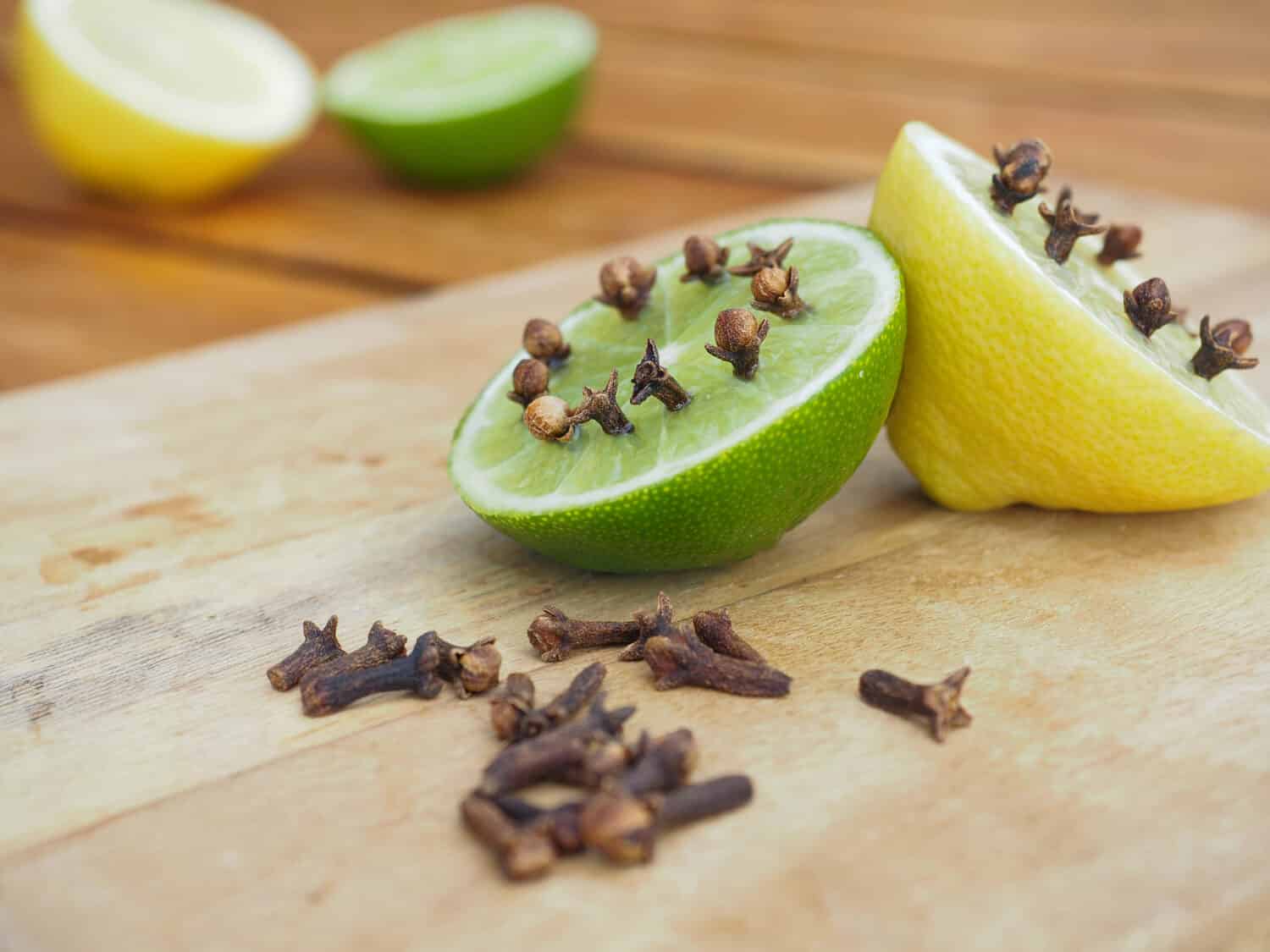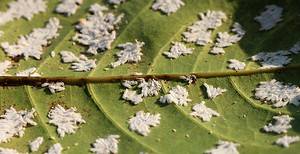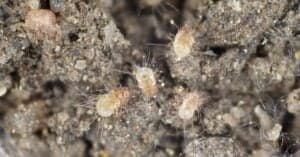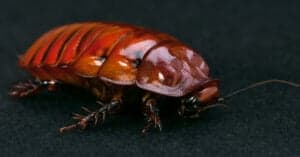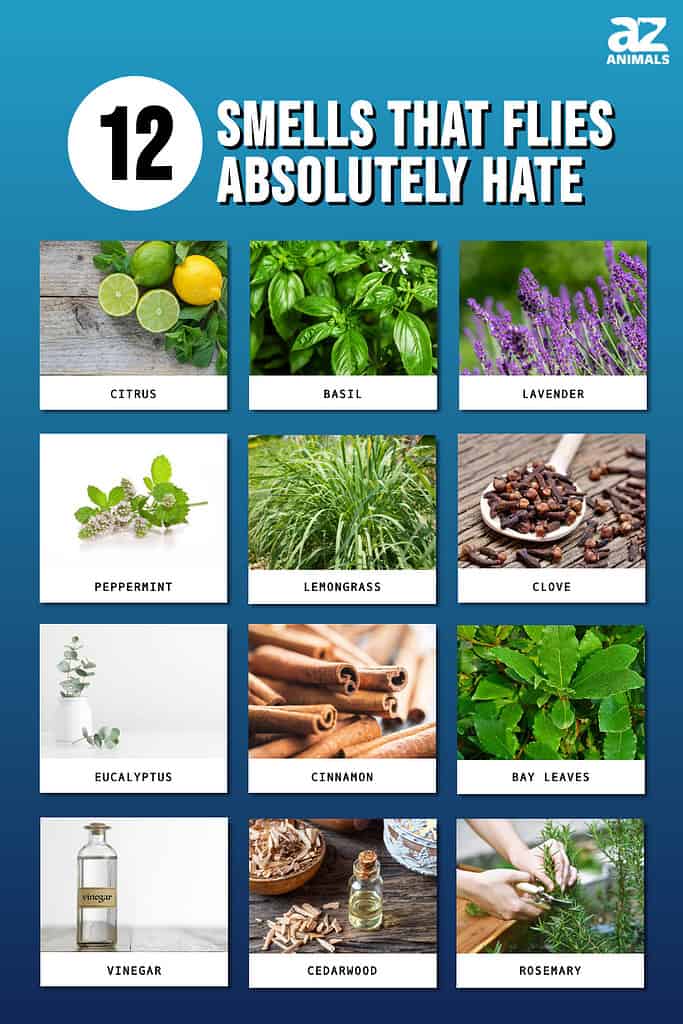
Flies, small and fast-breeding as they are, pose more than a nuisance. They are also carriers of diseases, making them a concern for public health. Fortunately, nature has equipped us with a diverse array of fly deterrents. These natural repellents, which are often readily available, provide a safe and non-toxic way to keep our environments free from flies.
In this article, we discover the 12 smells that flies absolutely hate. We delve into the specific smells that flies positively detest. We’ll explore a range of everyday household items, aromatic herbs, and spices and see how their unique scents can effectively deter flies. The focus will be not only on understanding how these scents repel flies but also on how we can utilize them in our homes to create a fly-free zone.
By tapping into the power of these natural repellents, we can establish a more comfortable and healthier living space for ourselves and our loved ones.
So let’s embark on this enlightening journey together.
#1 Citrus

Citrus fruits have a smell that many bugs hate, including flies.
©Viktory Panchenko/Shutterstock.com
Bursting with lively aroma, citrus fruits are a favorite in many households. Beyond their taste, citrus fruits offer an unexpected benefit—they’re highly effective in repelling flies.
Why Flies Hate Citrus
The acidic, sharp smell of citrus fruits is overwhelming for flies and something they hate. Both houseflies and fruit flies exhibit a pronounced distaste for this scent. Unlike us, who find citrus fragrances refreshing, flies find them strong and off-putting.
The Prominence of Lemons and Oranges
Of all the citrus varieties, lemons and oranges are particularly effective in repelling flies. They give off a robust citrus aroma, and their peels contain d-Limonene, an insect-repelling compound.
Using Citrus as a Fly Repellent
Citrus fruits provide a versatile arsenal for repelling flies. You can scatter fresh peels of oranges or lemons in areas where flies frequent. Placing them around windows, doors, and other entry points helps ward off these insects.
Another effective method uses citrus essential oils. Put a few drops on a cotton ball and position it in areas where flies gather. Alternatively, you can make a simple citrus spray by mixing water and a few drops of citrus essential oil. This spray can be applied around your home to deter flies.
Planting citrus trees or shrubs in your garden also helps keep flies away. The constant presence of the citrus aroma repels flies and maintains a comfortable outdoor environment.
#2 Basil
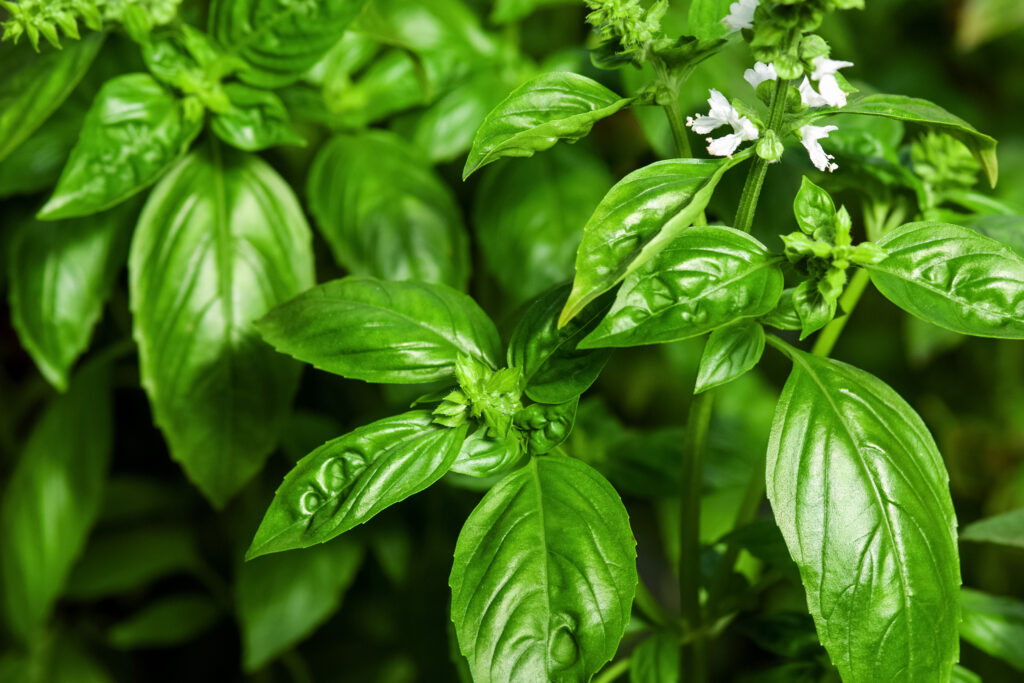
Sweet basil (pictured) has a bright green leaf with small white flowers and a slightly bitter flavor with notes of citrus and mint.
©Nadya So/Shutterstock.com
Basil is a culinary delight across the globe. Its vibrant flavor and fresh aroma grace countless dishes. This beloved herb, however, holds another less-known advantage – it’s an excellent fly deterrent.
Why Flies Hate Basil
Flies find the strong aroma of basil quite disagreeable. This pungent herb emits a volatile compound that disrupts the flies’ olfactory receptors, resulting in an environment they wish to avoid. This aversion is rooted in the flies’ survival instincts to evade plants that could potentially be harmful.
The Superiority of Sweet Basil
Among the wide array of basil types, sweet basil is particularly potent in repelling flies. Its distinct and robust aroma provides an effective barrier against these bothersome pests.
Using Basil as a Fly Repellent
Incorporating basil into your fly deterrence strategy is both practical and efficient.
One simple method involves positioning potted basil plants near entry points like windows and doors or even on kitchen counters. The basil’s ongoing aroma release will create a fly-repelling environment.
You can also assemble small bouquets of fresh basil leaves and place them around your home. As the leaves dry, they emit their unique, fly-deterring scent.
Basil essential oil offers another method for fly deterrence. Placing a few drops on a diffuser or on cotton balls scattered around your home will keep the flies at bay. Because even though you love the smell, flies will hate it.
#3 Lavender
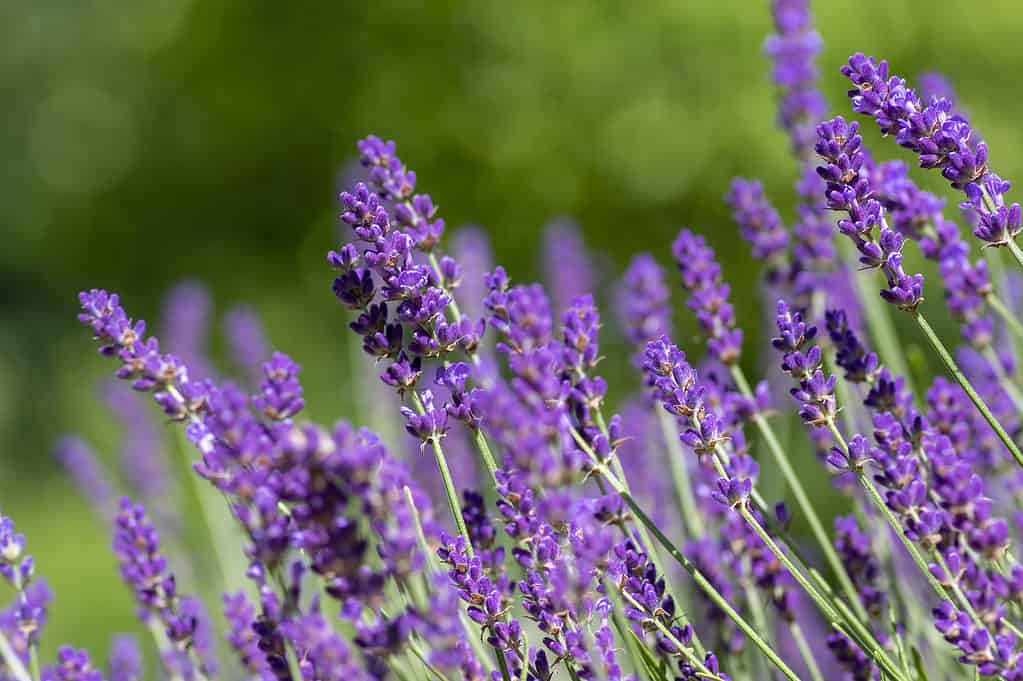
Lavender gives off a scent that most humans love, but flies detest!
©iStock.com/Iva Vagnerova
Lavender is a cherished plant celebrated for its striking purple blooms and soothing scent. It’s widely used in aromatherapy, cosmetics, and even in cooking. But it also holds a less well-known benefit—it’s a highly effective fly deterrent.
Why Flies Hate Lavender
While lavender’s fragrance is calming to humans, flies have a completely different reaction. The potent aroma, which comes from the essential oils present in the plant, is repellent to flies. This strong scent overwhelms their sensory perception, making it uncomfortable for them to remain in its vicinity. It smells lovely to us but flies absolutely hate it.
The Efficacy of English Lavender
Among the various species of lavender, English Lavender, known scientifically as Lavandula angustifolia, is particularly successful in repelling flies. Its high concentration of essential oils makes it an excellent choice for this purpose.
Using Lavender as a Fly Repellent
There are several ways to use lavender to keep flies at bay.
Placing fresh lavender bouquets in your home not only provides a delightful scent for you but it also deters flies. As the blooms dry out, they continue to emit the fly-repelling aroma.
Lavender plants placed near windows, doors, or other entry points effectively discourage flies from entering your home. As a bonus, they add a splash of color and charm to your garden or patio.
Lavender essential oil also makes a potent fly repellent. A few drops on a cotton ball placed in fly-infested areas can be surprisingly effective. Alternatively, a mixture of water and lavender essential oil can be spritzed around your home to deter flies.
#4 Peppermint
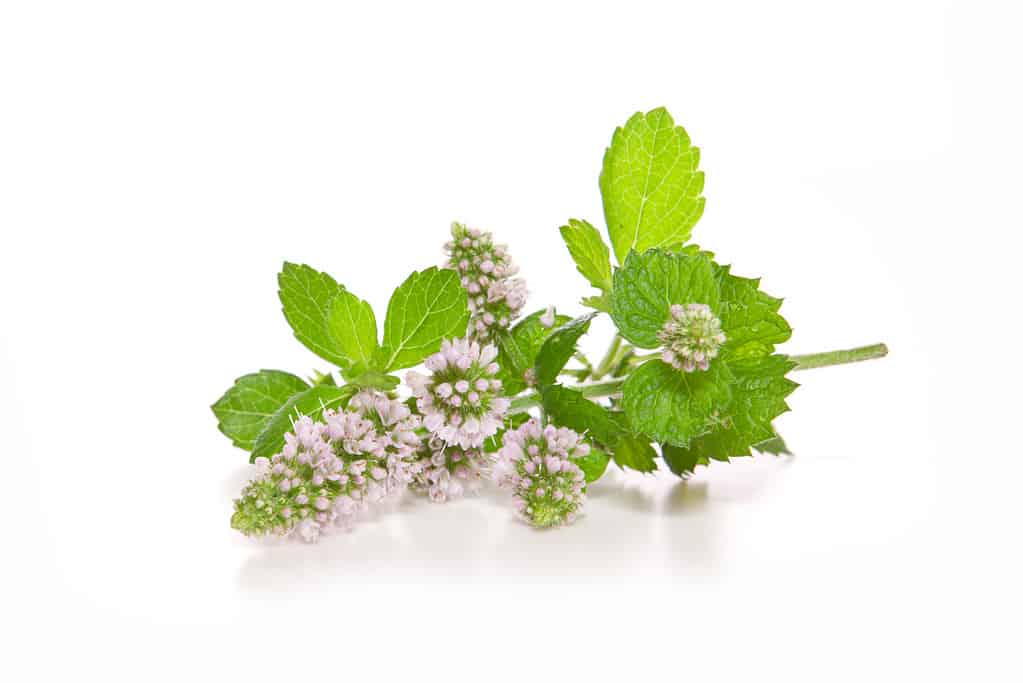
Peppermint (pictured) is a hybrid between spearmint and watermint.
©Swetlana Wall/Shutterstock.com
Peppermint is a familiar herb renowned for its invigorating scent and culinary uses. Its bright, crisp aroma refreshes the senses and enhances dishes. An unexpected benefit of this aromatic herb, however, is its ability to repel flies.
Why Flies Hate Peppermint
Flies find the strong, fresh aroma of peppermint overwhelming. This potent smell affects the flies’ sensory mechanisms, leading to a strong aversion. While we appreciate the cool, revitalizing scent of peppermint, flies hate the smell.
Prominence of Peppermint
Peppermint stands out among other herbs for its ability to repel flies due to its high concentration of menthol. This intense aroma makes peppermint particularly effective in keeping these bothersome insects at bay.
Using Peppermint as a Fly Repellent
There are several practical ways to utilize peppermint in the fight against flies.
Planting peppermint near entrances and windows can deter flies from entering your home. The constant emission of the peppermint scent can create a barrier that flies are reluctant to cross.
Creating bouquets of fresh peppermint leaves and placing them around your home can be an effective deterrent. As the leaves dry, they will continue to release the potent scent that repels flies.
Peppermint essential oil is another powerful tool. Applying a few drops on a cotton ball and positioning it in fly-prone areas can ward off these pests. A homemade peppermint spray, made by mixing water and a few drops of essential oil, can also be spritzed around your home for the same purpose.
#5 Lemongrass
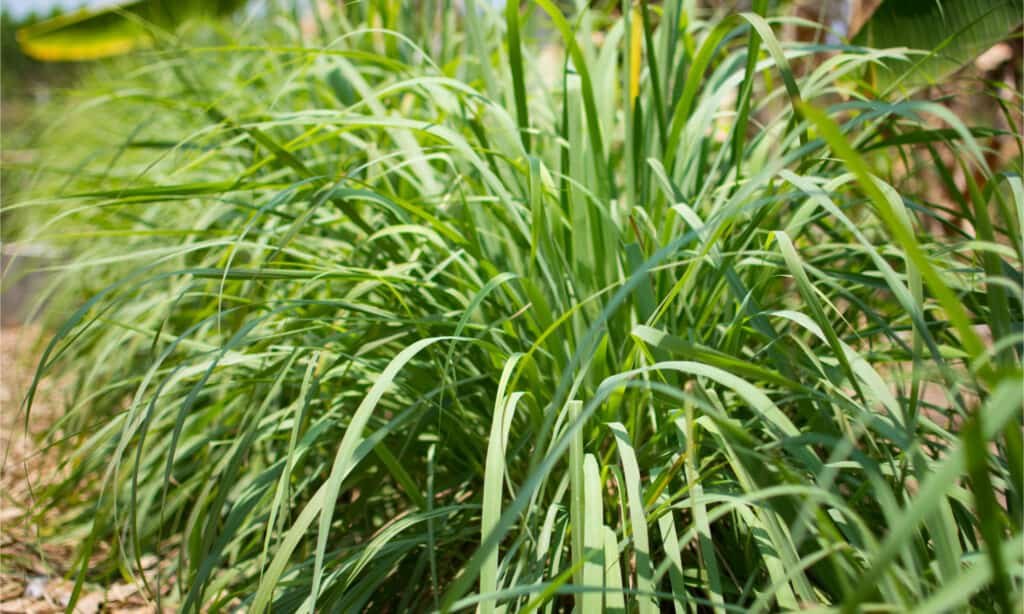
Lemongrass is a versatile herb that can be made into food and medicine.
©Nannie_iiuu/Shutterstock.com
Lemongrass, a tropical plant known for its citrusy aroma and culinary uses, has long been admired for its numerous benefits. One such advantage, often overlooked, is its remarkable capability to repel flies.
Why Flies Hate Lemongrass
Flies really hate the smell of lemongrass. The plant’s strong, lemon-like scent is intense to their sensitive olfactory receptors, leading to discomfort and driving them away. So, while humans may enjoy the fresh and invigorating aroma of lemongrass, flies find it intolerable.
Lemongrass: An Effective Deterrent
Lemongrass is particularly rich in citral and geraniol, compounds known to repel various insects, including flies. This makes lemongrass a highly effective tool in keeping these pesky insects at bay.
Using Lemongrass as a Fly Repellent
Several strategies can be employed to use lemongrass as a fly deterrent.
Planting lemongrass near entrances to your home or in fly-prone areas of your garden can create a barrier that flies are reluctant to cross. The plant’s continuous release of its potent aroma can help maintain a fly-free environment.
Another method involves making small bouquets of fresh lemongrass stalks and placing them strategically around your home. As the stalks dry, they continue to emit the fly-repelling scent.
Lemongrass essential oil is also a potent fly repellent. Placing a few drops on a cotton ball and leaving it in areas prone to fly infestation can effectively ward off these insects. A homemade spray of water mixed with lemongrass essential oil can also be used to deter flies from your home.
#6 Clove
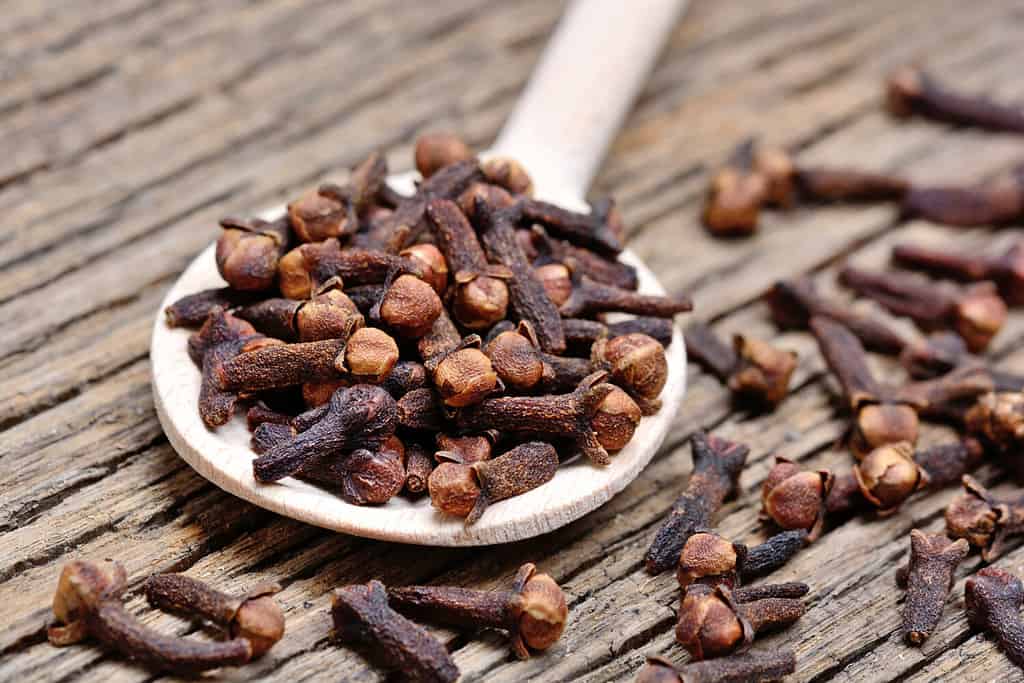
Cloves are native to Indonesia and originate from the clove tree.
©DeeaF/Shutterstock.com
Clove is a well-regarded spice with a rich history of use in culinary and medicinal practices. It is revered for its warm, sweet, and slightly bitter flavor and its potent aroma. What many don’t know is that this fragrance also makes clove an effective fly-repellent.
Why Flies Hate Clove
To flies, the strong, distinct aroma of clove is repulsive. This is due to the presence of eugenol, a compound that can disrupt the sensory perception of flies, making it an environment they prefer to avoid.
The Power of Clove
Clove stands out as a potent deterrent because of its unique scent profile. Its fragrance is much more intense than many other spices, making it particularly effective in repelling flies.
Using Clove as a Fly Repellent
Utilizing clove to keep flies at bay can be accomplished in several ways.
One common method involves pushing whole cloves into a lemon or apple, creating a potent, fly-repelling centerpiece. The moisture from the fruit helps to release the clove’s aroma, which flies find repellent.
Clove essential oil is another powerful deterrent. A few drops of clove oil on a cotton ball or in a diffuser can help to repel flies. You can also create a clove-infused spray by mixing water and clove essential oil, which can be used around the home.
#7 Eucalyptus

Besides repelling flies, eucalyptus leaves can help reduce stress and improve your sinuses.
©All for you friend/Shutterstock.com
Eucalyptus is a fast-growing evergreen tree native to Australia. It’s widely recognized for its medicinal properties and refreshing scent. Another interesting yet lesser-known aspect of eucalyptus is its ability to act as a natural fly repellent.
Why Flies Hate Eucalyptus
Eucalyptus emits a strong aroma that flies find unbearable. This is primarily due to a compound called eucalyptol, which overwhelms the sensory perception of flies and makes the surrounding environment inhospitable for them.
The Efficacy of Eucalyptus
Eucalyptus is an effective deterrent because of its potent scent. The robust, camphor-like smell makes it one of the best natural substances for repelling flies who hate it.
Using Eucalyptus as a Fly Repellent
There are several ways to use eucalyptus in your effort to repel flies.
One of the simplest methods involves placing fresh eucalyptus leaves in areas where flies frequent. As the leaves dry out, they release the fly-repelling aroma.
Eucalyptus essential oil is another useful tool. You can put a few drops on a cotton ball and position it in fly-prone areas. Alternatively, a spray can be made by combining water and eucalyptus essential oil, which can then be used throughout your home.
You can also consider planting eucalyptus trees or shrubs in your yard. Not only will this provide a constant source of this fly-repelling scent, but it will also add a beautiful, hardy plant to your landscape.
#8 Cinnamon
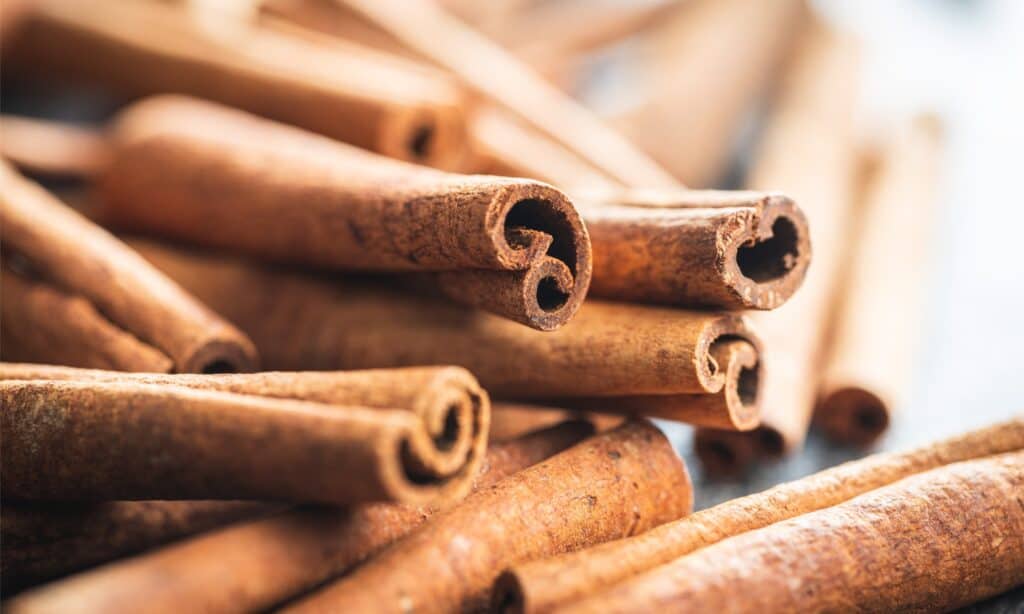
Cinnamon is thought to have many medicinal and soothing properties and is used frequently in Chinese herbal medicine.
©iStock.com/jirkaejc
Cinnamon is a beloved spice celebrated worldwide for its sweet and warming flavor. Its fragrant aroma, which delights our senses, also serves a dual purpose: it’s an effective fly deterrent.
Why Flies Hate Cinnamon
The strong aroma of cinnamon repels flies. The scent, which comes from an organic compound called cinnamaldehyde, is overpowering to their sensitive olfactory receptors, forcing them to stay away.
The Potency of Cinnamon
Cinnamon’s potency in repelling flies is impressive. Its rich, spicy aroma is much more intense compared to many other natural repellents, making it particularly effective against these common pests.
Using Cinnamon as a Fly Repellent
Several methods can help you leverage the power of cinnamon to repel flies.
Simply placing cinnamon sticks or sprinkling cinnamon powder in areas where flies gather can deter these pests. As the cinnamon interacts with the air, it releases its strong scent, creating a no-fly zone.
Cinnamon essential oil is another powerful option. A few drops on a cotton ball placed in high-fly-traffic areas can help keep these insects at bay. You can also create a cinnamon-infused spray by mixing water with a few drops of essential oil, which can be spritzed around your home.
#9 Bay Leaves
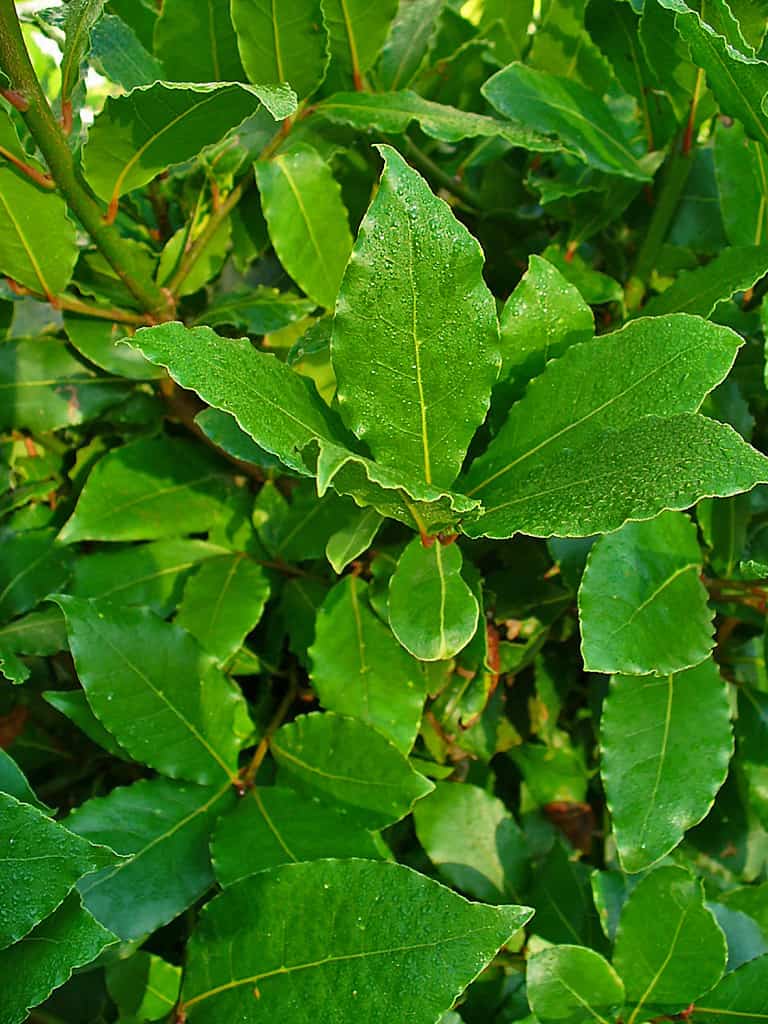
Photo of bay laurel (Taurus nobles), which is the leaf most commonly used to make bay leaves.
Bay leaves, familiar to many as a culinary herb, have a lesser-known use. Their strong, distinctive scent can repel flies, making them a useful tool for natural pest control.
Why Flies Hate Bay Leaves
Flies don’t enjoy the robust aroma of bay leaves. Compounds in the leaves, such as eugenol and cineol, interact with flies’ sensory perception. This interaction repels flies, creating an environment they prefer to avoid.
Bay Leaves: A Potent Repellent
With their intense fragrance, bay leaves offer potent fly-repelling properties. Their scent is much stronger than that of many other herbs, giving them an edge in driving flies away.
Using Bay Leaves as a Fly Repellent
Leveraging bay leaves to repel flies can be simple and effective.
You can place dried bay leaves in areas flies frequent. As these leaves dry, they release their strong scent, making the area less appealing to flies.
Bay leaf essential oil is another excellent deterrent. By placing a few drops of this oil on a cotton ball in areas where flies gather, you can keep these pests at bay. Mixing the essential oil with water to create a spray is another practical approach.
#10 Vinegar

Vinegar has many uses around the home, one of which is as a natural bug deterrent.
©focal point/Shutterstock.com
Vinegar, a common household item with numerous uses, also doubles as a fly repellent. It’s an affordable and easy-to-use solution for those pesky flying invaders.
Why Flies Hate Vinegar
Vinegar carries a sharp and potent aroma that flies find unbearable. The acetic acid in vinegar is particularly repulsive to flies, making it an efficient tool for deterring them.
The Power of Vinegar
Vinegar’s potent scent profile places it high on the list of effective fly repellents. Its widespread availability and inexpensive nature make it a go-to solution for many homeowners.
Using Vinegar as a Fly Repellent
There are various ways to utilize vinegar in your fight against flies.
One common method involves creating a homemade vinegar fly trap. Fill a jar halfway with vinegar, add a drop of dish soap (which breaks the surface tension), and cover the jar with plastic wrap. Poking holes in the plastic wrap allows flies to enter but not exit, trapping them.
Using a mixture of water and vinegar as a spray around windows and doors can also deter flies since they hate the smell and will generally stay away from sprayed areas.
Finally, simply leaving out a bowl of vinegar can act as a repellent due to its strong aroma.
#11 Cedarwood

The oils from the plant leave many bugs running even though the scent is sweet and powerful.
©Madeleine Steinbach/Shutterstock.com
Cedarwood, a durable and fragrant type of wood, serves more than just construction and decor. Its rich, earthy scent also acts as a natural fly repellent, making it useful in pest control.
Why Flies Hate Cedarwood
Flies find the strong scent of cedarwood overwhelming. The high concentration of aromatic compounds in cedarwood, like cedrol and cedrene, interact negatively with flies’ olfactory systems, keeping them away.
Cedarwood’s Repellent Power
The potency of cedarwood in repelling flies is impressive. Its unique aroma is distinctly different from other natural repellents, offering a new layer of defense against these pests.
Using Cedarwood as a Fly Repellent
There are several effective ways to incorporate cedarwood into your fly-repelling strategy.
Using cedarwood chips or blocks around your home can help repel flies. As the wood interacts with the air, it releases its robust scent, creating a no-fly zone.
Cedarwood essential oil is another powerful deterrent. A few drops on a cotton ball placed in strategic areas can help keep flies away. A homemade spray can also be created by combining water with a few drops of essential oil, offering a practical and easy-to-use solution.
#12 Rosemary
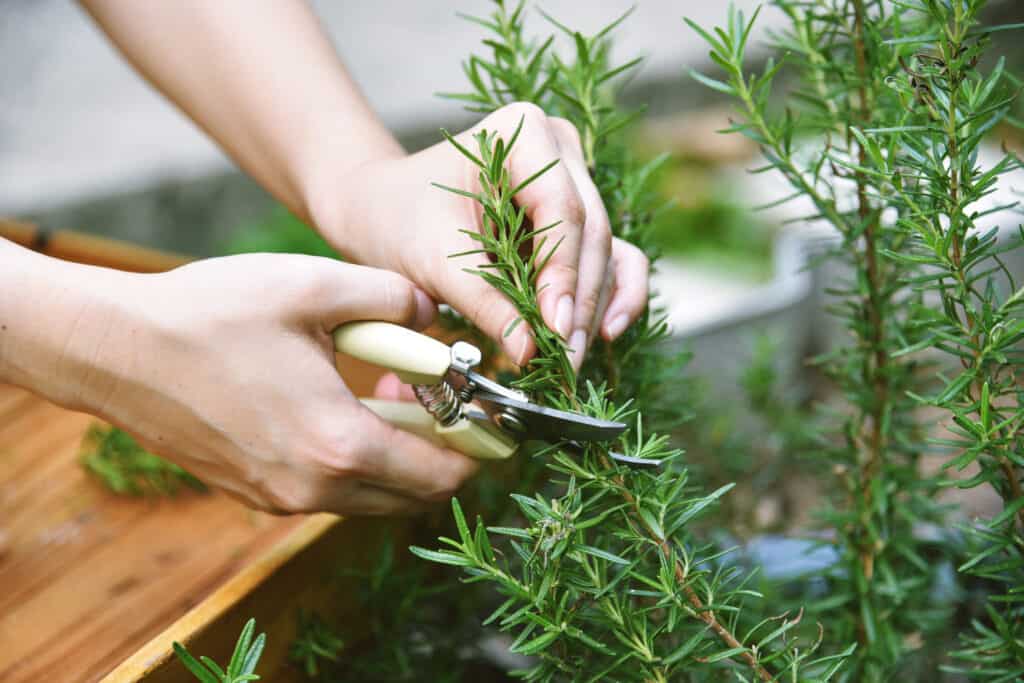
Rosemary has deep green needles, similar to a pine tree, which smell great to us, but flies hate it.
©iStock.com/Artfully79
Rosemary, a perennial herb with a pleasant, woody fragrance, is more than just a kitchen staple. It’s also an effective natural fly deterrent, adding another dimension to its range of uses.
Why Flies Hate Rosemary
The potent aroma of rosemary deters flies. The strong, pine-like fragrance, originating from compounds such as camphor and cineol, is unattractive to flies and keeps them at bay.
Rosemary’s Repelling Power
Rosemary’s robust scent profile makes it a potent fly-repellent. Its fragrance is significantly stronger than many other herbs, providing an effective shield against these common pests.
Using Rosemary as a Fly Repellent
There are various ways to harness rosemary’s fly-repelling properties.
Placing sprigs of rosemary in areas where flies gather can help deter them. As rosemary dries, it releases its strong scent, creating a less hospitable environment for flies.
Rosemary essential oil can also be used as a potent deterrent. By placing a few drops on a cotton ball in high-traffic fly areas, you can keep these pests away. Additionally, creating a rosemary-infused spray by mixing water and a few drops of essential oil can be effective.
Summary of the 12 Smells that Flies Absolutely Hate
Here are the 12 Smells that Flies Absolutely Hate:
| Rank | Smells |
|---|---|
| 1 | Citrus |
| 2 | Basil |
| 3 | Lavender |
| 4 | Peppermint |
| 5 | Lemongrass |
| 6 | Clove |
| 7 | Eucalyptus |
| 8 | Cinnamon |
| 9 | Bay Leaves |
| 10 | Vinegar |
| 11 | Cedarwood |
| 12 | Rosemary |
Key Takeaways
Our homes and gardens are rich sources of natural fly repellents. From the sharp aroma of citrus fruits to the calming scent of lavender, these scents can successfully keep flies at bay. The potent fragrances of herbs, spices, and essential oils not only repel these pests but also add delightful scents to our spaces, demonstrating nature’s power.
Employing these natural repellents provides an environmentally friendly approach to pest control, reducing our dependence on harmful chemical pesticides and promoting a healthier environment. A wide range of natural, easily accessible scents can be highly effective in deterring flies. Knowing we can rely on nature’s bounty to keep our homes pest-free is reassuring and pleasant.
Thank you for reading! Have some feedback for us? Contact the AZ Animals editorial team.

